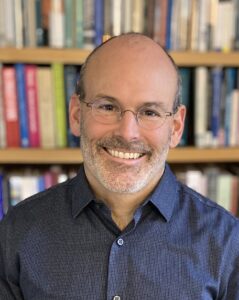Psychiatrist Explains Why You Fail Quitting Bad Habits (and How to Finally Break Free) - Dr. Jud Brewer
Wellness + Wisdom Podcast
Josh Trent
4.6 • 895 Ratings
🗓️ 15 July 2025
⏱️ 77 minutes
🧾️ Download transcript
Summary
Why can’t you quit your bad habits, no matter how hard you try? And are you ready to uncover the crucial missing link?
 Josh Trent welcomes Dr. Jud Brewer, Neuroscientist and Psychiatrist, to the Wellness + Wisdom Podcast, episode 758, to reveal how your survival mechanisms hijack your mind, why willpower is NOT the key to quitting bad habits, and how understanding habit formation rewires your brain for lasting change.
Josh Trent welcomes Dr. Jud Brewer, Neuroscientist and Psychiatrist, to the Wellness + Wisdom Podcast, episode 758, to reveal how your survival mechanisms hijack your mind, why willpower is NOT the key to quitting bad habits, and how understanding habit formation rewires your brain for lasting change.
🧠 Korrect Life
Experience clarity, calm, and deep focus with Korrect Life’s Fuel + Energy products breakthrough - designed to nourish your nervous system, ease stress, and support peak brain function. 👉 Start feeling the difference + use code JOSH15 for 15% off your order at joshtrent.com/korrectlife
💧 My Pure Water Distiller
Your water is only as pure as your source. With the My Pure Water Automatic Water Distiller, you can eliminate toxins, heavy metals, and chemicals from your drinking water - giving your family the cleanest, freshest hydration possible. It's the gold standard in home water purification.
👉 Make the upgrade today: Go to joshtrent.com/mypurewater
Use code JOSH5 at checkout to save 5% on your distiller.
🔬 Healthletic Methylene Blue + BPC-157
Boost your mitochondria, accelerate recovery, and enhance performance with Healthletic’s cutting-edge combo: Pharmaceutical-grade Methylene Blue and BPC-157. Trusted by top athletes and health pioneers, this duo supports cognitive clarity, cellular energy, and total-body healing. 👉 Get 15% off your order with code JOSH15 at joshtrent.com/healthletic
In This Episode, Dr. Jud Brewer Uncovers:
[00:55] Understanding The Mind
- Why doom scrolling numbs us out and allows us to avoid feeling shame.
- How our survival mechanisms trick our brain.
- How meditation helped Dr. Jud understand and take control of his mind.
Resources:
- Dr. Jud Brewer
- 319 Dr. Jud Brewer: Simple Ways To Break Bad Habits
- 388 Dr. Jud Brewer | Unwinding Anxiety: New Science Shows How to Break the Cycles of Worry and Fear to Heal Your Mind
[06:05] How to Heal Anxiety
- How curiosity helped Dr. Jud start question about his mind and explore what to do about it.
- Why only 1 in 5 people see improvement when taking anxiety medication.
- The mindfulness app Dr. Jud and his team developed has an over 60% success rate in treating anxiety.
[10:40] Can It Be Easy to Change Bad Habits?
- When we don't know how our brain works, we can't make it work for us.
- The importance of understanding how habits are formed.
- How we can unlearn habits that get in the way of our growth.
- Why awareness is essential in changing our habits.
[14:00] You Generate Your World Based on Your Past
- Why we can't solve a problem from the same level of consciousness that created it.
- How we can't think our way out of a habit.
- Which brain regions help us strengthen our neuro-pathways.
- How we can't process all the sensory information that happen in one moment.
- Why we're all hallucinating our world based on our past experience.
- How our expectations limit our sensory information according to the story we tell ourselves.
Resources:
[21:35] What Is The Source of Your Curiosity?
- A Painful Case by James Joyce
- Why most people are disembodied.
- How psychedelics open us up to seeing the world clearly without the stories we're telling ourselves.
- The difference between deprivation curiosity and interest curiosity.
- Why information is essential for survival.
Resources:
[28:05] Curiosity Heals Anxiety
- How children have curiosity that's driven by joy.
- Why we lose interest curiosity as we grow older.
- How interest curiosity can help us with anxiety.
- Why curiosity opens us to learning.
- How interest curiosity improves the way we approach conflict.
- Why we can't fake curiosity.
[37:25] Psychedelics + Parts Work
- How IFS therapy with MDMA changed how Josh sees his partner.
- Why we don't realize that our stories get in the way.
- The similarities between meditation and mind-expanding drugs.
Resources:
[47:10] Willpower Doesn't Heal Addiction
- How the definition of addiction has evolved.
- Why social media and advertising are engineered to be addictive.
- How some everyday actions can turn into an addiction.
- Why people believe they need more willpower to heal from addiction.
- We don't have willpower, but we have awareness.
- How addiction is a result of behavior.
Resources:
[54:00] How to Let Go of Porn Addiction
- Mindshift Recovery
- How Dr. Jud has been helping people understand how their brains work and how to heal their addictions.
- Why pornography can't replace an authentic connection.
- How porn addiction is healed the same way as any other addiction.
- Why our brains are always comparing.
- Why Dr. Jud can't convince anyone to heal, but can offer his curiosity and care.
Resources:
[01:01:35] The Relation Between Addiction + Trauma
- How we can't separate the brain and the body.
- Why people who struggle with addiction are interested in understanding how their brain works.
- How people develop wisdom through their own experience.
- Why the cause of addiction doesn't matter.
- How our reward value creates a positive prediction.
Resources:
[01:09:15] The Only Way Out Is Through
- How avoiding unpleasant sensations makes us not process negative emotions.
- The importance of being open to feeling difficult emotions.
- How we can become curious about our emotions and where we feel them in our body.
- Why the cure for the pain is the pain.
- How self-judgment can be
Leave Wellness + Wisdom a Review on Apple Podcasts
All Resources From This Episode
- Dr. Jud Brewer
- 319 Dr. Jud Brewer: Simple Ways To Break Bad Habits
- 388 Dr. Jud Brewer | Unwinding Anxiety: New Science Shows How to Break the Cycles of Worry and Fear to Heal Your Mind
- Power vs. Force by David R. Hawkins
- A Painful Case by James Joyce
- Richard C. Schwartz, Ph.D.
- Gabor Mate
- Mindshift Recovery
- The Body Keeps The Score by Bessel van der Kolk
Power Quotes from Dr. Jud Brewer
"Changing a habit is not about willpower. We don't really have willpower. What we do have is awareness. We can't think our way out of a habit because that's not how they form. We have to feel our way out." — Dr. Jud Brewer
"Addiction is habits. And the behavior that we have is driven by feeling unpleasant and we want it to go away. Often we get this brief relief but it's actually perpetuating the cycle. And it's just feeding the want of wanting to feel better instead of meeting the need for connection. We're just putting band aids upon band aids because we don't know how our brains work." — Dr. Jud Brewer
"We're all hallucinating our world. We're generating our world. We're creating a story of the world every moment that is based on our past experience." — Dr. Jud Brewer
Josh's Trusted Products | Up To 40% Off
Biohacking
- Korrect Life - 15% OFF WITH CODE "JOSH15"
- MANNA Vitality - Save 20% with code JOSH20
- HigherDOSE - 15% off with the code WELLNESSANDWISDOM
- PLUNGE - $150 off with discount code WELLNESSFORCE
- Pulsetto - Save 20% with code "JOSH"
- SaunaSpace - 10% off with discount code JOSH10
- Ultrahuman Ring Air - 10% off with code JOSH
- NutriSense - 30% off with WELLNESSFORCE
Wellness Test Kits
- Choose Joi - Save 50% on all Lab Tests with JOSH
- Blokes - Save 50% on all Lab Tests with JOSH
- FertilityWize Test by Clockwize - Save 10% with code JOSH
- Tiny Health Gut Tests - $20 off with discount code JOSH20
- VIVOO Health Tests - Save 30% off with code JOSH
- SiPhox Health Blood Test - Save 15% off with code JOSH
Nutrition + Gut Health
- Organifi - 20% off with discount code WELLNESSFORCE
- SEED Synbiotic - 25% off with the code 25JOSHTRENT
- Paleovalley - Save 15% off here!
- EQUIP Foods - 20% off with the code WELLNESS20
- DRY FARM WINES - Get an extra bottle of Pure Natural Wine with your order for just 1¢
- Just Thrive - 20% off with the code JOSH
- Legacy Cacao - Save 10% with JOSH when you order by the pound!
- Kreatures of Habit - Save 20% with WISDOM20
- Force of Nature Meats - Save 10% with JOSH
Supplements
- Adapt Naturals - 20% off with discount code WELLNESSFORCE
- MitoZen - 10% off with code WELLNESSFORCE
- Activation Products - 20% off with code JOSH20
- BiOptimizers - 10% off with discount code JOSH10
- Fatty15 Essential Fatty Acids Supplement - Get 15% off with code JOSH15
Sleep
- BiOptimizers Sleep Breakthrough - 10% off with JOSH10
- Zyppah Anti-Snoring Mouthpiece - 20% off with the code JOSH
- MitoZen Super SandMan Ultra™ (Melatonin Liposomal)+ 10% off with WELLNESSFORCE
- Luminette Light Therapy Glasses - 15% off with JOSH
- Cured Nutrition CBN Night Oil - 20% off with JOSH
Natural Energy
- MTE - Save 20% with JOSH
- TruKava - Save 20% with code JOSH20
- Drink Update - Save 25% with discount code JOSH25
- Lifeboost Coffee - Save 10% with JOSH10
- EONS Mushroom Coffee - 20% off with the discount code JOSH20
- EnergyBITS - 20% off with the code WELLNESSFORCE
- BUBS Naturals - Save 20% with JOSH20
Fitness + Physical Health
- Detox Dudes Online Courses - Up to $500 off with discount code JOSH
- Kineon - 10% off with discount code JOSH10
- Create Wellness Creatine Gummies - 20% off with discount code JOSH
- BioPro+ by BioProtein Technology - Save $30 OFF WITH CODE JOSH
- Drink LMNT - Zero Sugar Hydration: Get your free LMNT Sample Pack, with any purchase
- Myoxcience - 20% off with the code JOSH20
Healthy Home
- SunHome Saunas - Save $200 with JOSH200
- JASPR Air Purifier - Save 10% with code WELLNESS
- QI-Shield EMF Device by NOA AON - 20% off with the code JOSH
- Holy Hydrogen - $100 off with discount code JOSH
- SimplyO3 - 10% off with discount code JOSH10
- LEELA Quantum Upgrade + Frequency Bundles - Get 15 days free with code JOSH15
- TrulyFree Toxic- Free Cleaning Products - Get 40% off + Freebies with code WELLNESSFORCE
Mental Health + Stress Release
- NOOTOPIA - 10% off with the discount code JOSH10
- CalmiGo - $30 off the device with discount code JOSH30
- QUALIA - 15% off with WELLNESSFORCE
- LiftMode - 10% off with JOSH10
Personal Care
- The Wellness Company's Emergency Health Kits + More - Save 10% with code JOSH
- Canopy Filtered Showerhead + Essential Oils - Save 15% with JOSH15
- Farrow Life - Save 20% with JOSH
- Timeline Nutrition - 10% off with JOSH
- Intelligence of Nature - 15% off Skin Support with the code JOSH15
- Young Goose - Save 10% with code JOSH10
Mindfulness + Meditation
- BREATHE - 33% off with the code PODCAST33
- Neuvana - 15% off with the code WELLNESSFORCE
- Essential Oil Wizardry - 10% off with the code WELLNESSFORCE
- Four Visions - Save 15% with code JOSH15
- Lotuswei - 10% off with JOSH
Clothing
About Dr. Jud Brewer

Dr. Jud Brewer, MD, PhD, is a pioneering psychiatrist and neuroscientist whose breakthrough fMRI studies first revealed how mindfulness training quiets the brain’s default-mode network, linking reduced self-referential thinking to improved attention and emotional regulation.
His lab has mapped the neural circuitry of craving and habit, demonstrating that mindfulness-based interventions can halve relapse rates in smoking cessation compared to gold-standard behavioral programs.
With over 15,000 citations to his name, Dr. Jud continues to translate cutting-edge neurobiological insights into transformative strategies for mental health and habit change.
Transcript
Click on a timestamp to play from that location
| 0:00.0 | If you want to change a habit, it's not about willpower. We don't really have willpower. |
| 0:04.9 | What we do have is awareness. We can't think our way out of a habit because that's not how they form. |
| 0:11.0 | We have to feel our way out. |
| 0:13.4 | Dr. Judd Brewer is a New York Times best-selling author and thought leader in the field of habit change. |
| 0:19.5 | How does this relate to addiction? It's really about just seeing, oh, these are habits. |
| 0:22.6 | And the behavior that I have is driven because I feel unpleasant. |
| 0:26.6 | I want to make that go away. |
| 0:28.6 | Because often we get this brief relief, but we have to see that that's actually perpetuating the cycle. |
| 0:32.6 | And it's just feeding a want, which is I want to feel better, |
| 0:36.6 | instead of meeting a need, which is I need to feel better, instead of meeting a need, |
| 0:38.2 | which is I need connection. |
| 0:40.3 | And then we get addicted to that because we're just putting band-aids upon band-aids upon band-aids |
| 0:45.5 | because we don't know how our brains work. |
| 0:47.0 | Because if we don't know how our brain works, how can we possibly put our brain to work for us? |
| 0:52.8 | And the only way to change it is to... |
| 0:58.0 | So, people are doom scrolling at a rate maybe we've never seen before. And you said something |
| 1:05.2 | recently in an interview that just rocked my world. You said, shame is a habit loop. Self-flagellation feels better than doing |
| 1:13.2 | nothing. How does that relate to our addiction with phones right now? Oh, it's everything. |
| 1:19.9 | You know, shame feels bad. Doom scrolling numbs us out. And so it feels better than beating ourselves up. |
| 1:29.1 | So we do it. |
| 1:30.0 | So you can see that shame feels better than doing nothing. |
| 1:34.2 | Doom scrolling feels better than feeling ashamed of ourselves. |
... |
Transcript will be available on the free plan in 21 days. Upgrade to see the full transcript now.
Disclaimer: The podcast and artwork embedded on this page are from Josh Trent, and are the property of its owner and not affiliated with or endorsed by Tapesearch.
Generated transcripts are the property of Josh Trent and are distributed freely under the Fair Use doctrine. Transcripts generated by Tapesearch are not guaranteed to be accurate.
Copyright © Tapesearch 2025.

